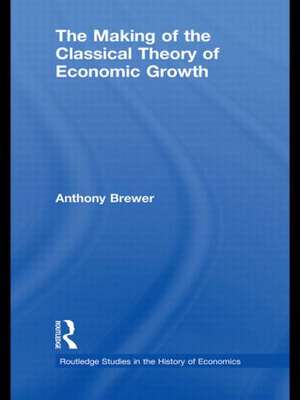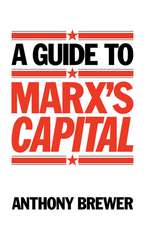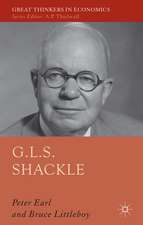The Making of the Classical Theory of Economic Growth: Routledge Studies in the History of Economics
Autor Anthony Breweren Limba Engleză Hardback – 11 aug 2010
This book looks at many of the key players such as Smith, Hume, Ferguson, Steuart, Turgot, West and Rae and is tied together with a rigorous introduction and a new chapter on capital accumul
| Toate formatele și edițiile | Preț | Express |
|---|---|---|
| Paperback (1) | 484.47 lei 6-8 săpt. | |
| Taylor & Francis – 11 noi 2013 | 484.47 lei 6-8 săpt. | |
| Hardback (1) | 1055.51 lei 6-8 săpt. | |
| Taylor & Francis – 11 aug 2010 | 1055.51 lei 6-8 săpt. |
Din seria Routledge Studies in the History of Economics
-
 Preț: 370.72 lei
Preț: 370.72 lei -
 Preț: 302.54 lei
Preț: 302.54 lei - 8%
 Preț: 392.82 lei
Preț: 392.82 lei -
 Preț: 311.28 lei
Preț: 311.28 lei - 9%
 Preț: 1003.10 lei
Preț: 1003.10 lei -
 Preț: 665.68 lei
Preț: 665.68 lei - 9%
 Preț: 935.39 lei
Preț: 935.39 lei -
 Preț: 384.63 lei
Preț: 384.63 lei -
 Preț: 280.74 lei
Preț: 280.74 lei -
 Preț: 326.99 lei
Preț: 326.99 lei -
 Preț: 318.31 lei
Preț: 318.31 lei -
 Preț: 214.15 lei
Preț: 214.15 lei -
 Preț: 310.43 lei
Preț: 310.43 lei -
 Preț: 326.82 lei
Preț: 326.82 lei -
 Preț: 308.97 lei
Preț: 308.97 lei -
 Preț: 324.46 lei
Preț: 324.46 lei -
 Preț: 395.81 lei
Preț: 395.81 lei -
 Preț: 392.71 lei
Preț: 392.71 lei - 26%
 Preț: 850.91 lei
Preț: 850.91 lei - 27%
 Preț: 995.39 lei
Preț: 995.39 lei - 18%
 Preț: 1005.01 lei
Preț: 1005.01 lei - 18%
 Preț: 1002.60 lei
Preț: 1002.60 lei - 26%
 Preț: 1046.46 lei
Preț: 1046.46 lei - 18%
 Preț: 1280.31 lei
Preț: 1280.31 lei - 18%
 Preț: 1055.51 lei
Preț: 1055.51 lei - 18%
 Preț: 1055.51 lei
Preț: 1055.51 lei - 28%
 Preț: 987.72 lei
Preț: 987.72 lei - 25%
 Preț: 824.17 lei
Preț: 824.17 lei - 18%
 Preț: 1061.93 lei
Preț: 1061.93 lei - 18%
 Preț: 716.32 lei
Preț: 716.32 lei - 18%
 Preț: 1006.07 lei
Preț: 1006.07 lei - 18%
 Preț: 1069.92 lei
Preț: 1069.92 lei - 12%
 Preț: 342.67 lei
Preț: 342.67 lei - 26%
 Preț: 991.34 lei
Preț: 991.34 lei - 18%
 Preț: 1056.00 lei
Preț: 1056.00 lei - 18%
 Preț: 1076.53 lei
Preț: 1076.53 lei - 18%
 Preț: 698.08 lei
Preț: 698.08 lei - 22%
 Preț: 332.02 lei
Preț: 332.02 lei - 18%
 Preț: 1169.78 lei
Preț: 1169.78 lei - 18%
 Preț: 1059.84 lei
Preț: 1059.84 lei - 30%
 Preț: 852.88 lei
Preț: 852.88 lei - 25%
 Preț: 830.10 lei
Preț: 830.10 lei - 18%
 Preț: 1125.78 lei
Preț: 1125.78 lei - 18%
 Preț: 1062.98 lei
Preț: 1062.98 lei - 18%
 Preț: 847.96 lei
Preț: 847.96 lei - 18%
 Preț: 953.01 lei
Preț: 953.01 lei - 18%
 Preț: 1168.76 lei
Preț: 1168.76 lei
Preț: 1055.51 lei
Preț vechi: 1287.22 lei
-18% Nou
Puncte Express: 1583
Preț estimativ în valută:
201.97€ • 211.44$ • 167.12£
201.97€ • 211.44$ • 167.12£
Carte tipărită la comandă
Livrare economică 05-19 aprilie
Preluare comenzi: 021 569.72.76
Specificații
ISBN-13: 9780415486200
ISBN-10: 0415486203
Pagini: 224
Ilustrații: 1 b/w image and 1 line drawing
Dimensiuni: 156 x 234 x 18 mm
Greutate: 0.48 kg
Ediția:1
Editura: Taylor & Francis
Colecția Routledge
Seria Routledge Studies in the History of Economics
Locul publicării:Oxford, United Kingdom
ISBN-10: 0415486203
Pagini: 224
Ilustrații: 1 b/w image and 1 line drawing
Dimensiuni: 156 x 234 x 18 mm
Greutate: 0.48 kg
Ediția:1
Editura: Taylor & Francis
Colecția Routledge
Seria Routledge Studies in the History of Economics
Locul publicării:Oxford, United Kingdom
Public țintă
Postgraduate and UndergraduateCuprins
Part 1: The Invention of Economic Growth 1. Introduction 2. The Concept of Growth in Eighteenth Century Economics Part 2: The Scottish Tradition from Hume to Smith 3. An Eighteenth Century View of Economic Development: Hume and Steuart 4. Luxury and Economic Development: David Hume and Adam Smith 5. Adam Ferguson, Adam Smith, and the Concept of Economic Growth Part 3: Accumulation and Growth: Turgot and Smith 6. Turgot, Founder of Classical Economics 7. Turgot, Smith, and Capital Accumulation Part 4: Growth, Saving and Distribution 8. Adam Smith on Classes and Saving 9. Rent and Profit in the Wealth of Nations 10. Edward West and the Classical Theory of Distribution and Growth Part 5: Epilogue: John Rae and Technical Change 11. Economic Growth and Technical Change: John Rae's Critique of Adam Smith 12. Invention
Notă biografică
Professor Anthony Brewer taught economics at the University of Bristol from 1967 onwards, with spells as an academic visitor at Duke University, Chuo University, and elsewhere. He is now retired, but still active in the subject, with the title of Emeritus Professor of the History of Economics. He has been Secretary and Vice-President of the European Society for the History of Economic Thought.
Descriere
This book collects together for the first time Anthony Brewer’s work on the origins and development of the theory of economic growth from the late eighteenth century and looking at how it came to dominate economic thinking in the nineteenth century.





















